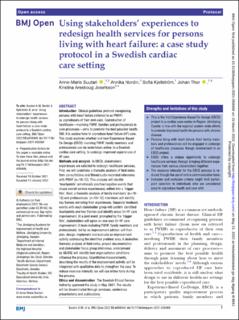| dc.description.abstract | Introduction: Clinical guidelines promote recognising persons with heart failure (referred to as PWHF) as coproducers of their own care. Coproduction of healthcare—involving PWHF, families and professionals in care processes—aims to promote the best possible health. Still, it is unclear how to coproduce heart failure (HF) care. This study explores whether and how Experience-Based Co-Design (EBCD) involving PWHF, family members and professionals can be undertaken online, in a Swedish cardiac care setting, to codesign improved experiences of HF care.
Methods and analysis: In EBCD, stakeholders’ experiences are solicited to redesign healthcare services. First, we will undertake a thematic analysis of field notes from consultations and filmed/audio-recorded interviews with PWHF (n=10–12). This analysis will identify ‘touchpoints’ (emotionally positive/negative events that shape overall service experiences), edited into a ‘trigger film’. Next, a thematic analysis of family members’ (n=10– 12) and professionals’ (n=10–12) interviews will identify key themes mirroring their experiences. Separate feedback events with each stakeholder group will confirm identified touchpoints and key themes and identify areas for HF care improvement. At a joint event, prompted by the ‘trigger film’, stakeholders will agree on one area for HF care improvement. A team including PWHF, family members and professionals, led by an improvement adviser, will then plan, design, implement and evaluate an improvement activity addressing the identified problem area. A deductive thematic analysis of field notes, project documentation and stakeholder focus group interviews, underpinned by MUSIQ, will identify how organisational conditions influence the process. Quantitative measurements, describing the results of the improvement activity, will be integrated with qualitative data to strengthen the case. To reduce resource intensity, we will use online tools during the process.
Ethics and dissemination: The Swedish Ethical Review Authority approved the study in May 2021. The results will be disseminated through seminars, conference presentations and publications. | en_US |

